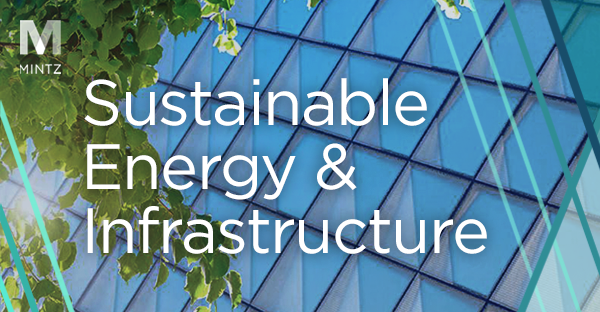NERC Submits Work Plan for New Reliability Requirements to Apply to Inverter-Based Resources
On January 17, 2024, the North American Electric Reliability Corporation (“NERC”)[1] submitted an informational filing[2] to the Federal Energy Regulatory Commission (“FERC”) providing NERC’s plan (the “Work Plan”) to develop new and revised reliability standards to address certain reliability risks posed by the rapid growth of inverter-based resources (or “IBRs”) on the bulk power system.
As defined by FERC, IBRs include all generation resources that connect to the bulk power system using power electronic devices that change direct current (DC) power produced by a resource to alternating current (AC) power compatible with distribution and transmission grids.[3] IBRs may refer to solar photovoltaic (PV), wind, fuel cell, and battery storage resources.[4]
NERC submitted the Work Plan as an initial step to comply with FERC Order No. 901, issued on October 19, 2023. In this order, FERC directed NERC to develop new and revised reliability standards for IBRs to address concerns that certain IBRs were tripping offline during grid disturbances.
Background
In Order No. 901, while FERC recognized that certain IBRs can react nearly instantaneously to changing grid conditions, FERC also expressed concerns that other IBRs may not be properly configured or programmed to support grid voltage and frequency in the event of a system disturbance, and, as a result, may reduce power output, exhibit momentary cessation, or trip in response to variations in system voltage or frequency.[5] In other words, under certain conditions, such IBRs may “cease to provide power to the bulk power system due to how they are configured and programmed.”[6]
Accordingly, FERC directed NERC to develop new and revised reliability standards to address the following four broad topic areas for which it determined reliability gaps exist in the current reliability standards with respect to IBRs: (1) data sharing requirements; (2) data and model validation requirements; (3) planning and operational studies requirements; and (4) performance requirements.[7]
As part of the process to adopt new or modified reliability standards, NERC must file the proposed modifications or new standards at FERC. While FERC did not set specific deadlines for implementing the new standards to be proposed by NERC pursuant to Order No. 901, FERC did state that it is “concerned that the lack of a time limit for implementation could allow identified issues to remain unresolved for a significant and indefinite period.”[8] FERC indicated that it “will take these issues into account when it considers the proposed implementation plan for each new or modified Reliability Standard when it is submitted for Commission.”[9]
FERC expressed, as a general matter, that “there is a need to have all the directed Reliability Standards effective and enforceable well in advance of 2030” and directed NERC to ensure that its associated implementation plans sequentially stagger the effective and enforceable dates to ensure an orderly industry transition for complying with the IBR directives in Order No. 901 prior to 2030.[10]
Among other things, FERC directed NERC to submit an informational filing within 90 days of the issuance of Order No. 901 to include “a detailed, comprehensive standards development plan and explanation of how NERC will prioritize the development of new or modified Reliability Standards.”[11]
NERC Work Plan
NERC’s Work Plan consists of four key milestones with associated dates for completion:
- Submission of Order No. 901 Work Plan (completed: January 2024) (“Milestone 1”)
- Development and Filing of Reliability Standards to Address Performance Requirements and Post-Event Performance Validation for Registered IBRs (proposed completion: November 4, 2024) (“Milestone 2”)
- Development and Filing of Reliability Standards to Address Data Sharing and Model Validation for all IBRs (proposed completion: November 4, 2025) (“Milestone 3”)
- Development and Filing of Reliability Standards to Address Planning and Operational Studies Requirements for all IBRs (proposed completion: November 4, 2026) (“Milestone 4”)[12]
NERC achieved Milestone 1 through filing its Work Plan on January 17, 2024.
Milestone 2 consists of NERC filing modified reliability standards (already under development) relating to: (1) disturbance monitoring, (2) generator ride-through (which refers to a generating facility staying connected to and synchronized with the transmission system during system disturbances within a range of over- and under-frequency conditions, in accordance with Good Utility Practice[13]), and (3) analysis and mitigation of battery electric storage IBR performance issues.[14]
Milestone 3 consists of NERC filing new standards relating to data sharing and “model validation” for IBRs.[15] Model validation refers to the process for ensuring that planners and operators have accurate planning, operational, and interconnection-wide data to ensure accurate design, infrastructure, and interconnection-related models for reliability purposes.[16]
Milestone 4 entails NERC building upon modeling practices developed per revisions conducted within Milestone 3, in order to identify which planning and operational studies must be leveraged to evaluate model data quality with performance data and ensure that future studies reflect any model changes.[17]
Stakeholders will have an opportunity to comment on each of the new or modified reliability standards after they are submitted to FERC.
Analysis and Takeways
Subjecting IBRs to more stringent reliability standards poses the risk that IBR owners will be required to increase capital expenditures and/or operational and maintenance (“O&M”) expenses for IBRs, including for projects that have been in operation for years. While these increased expenses in some instances may be de minimus, in other instances they could significantly impact IBRs’ ongoing cash flows. Accordingly, IBR project developers, long-term owners and investors should pay close attention to NERC’s upcoming FERC filings and should also consider commenting on the filings so that final standards that are eventually adopted are not cost prohibitive or impractical to comply with.
For questions about these and other relates issues, please contact Mintz.
Endnotes
[1] NERC is the Electric Reliability Organization (“ERO”) for North America, subject to oversight by FERC and governmental authorities in Canada.In the United States, FERC has regulatory authority over reliability issues concerning the bulk power system and sets applicable policies, while NERC, as the ERO, develops and enforces the technical standards that must be adhered to by industry participants in accordance with the regulations and policies established by FERC.This collaboration serves the purpose of assuring effective and efficient reduction of risks to the reliability and security of the bulk power system.
[2] Informational Filing of the North American Reliability Corporation Regarding the Development of Reliability Standards Responsive to Order No. 901, Docket No. RM22-12-000 (Jan. 17, 2024).
[3] See Reliability Standards to Address Inverter-Based Resources, Order No. 901, 185 FERC ¶ 61,042, at P 1 n.3 (2023) (“Order No. 901”).
[4] See id.
[5] See id. at P 12.
[6] Id.
[7] See id. at PP 1, 16, 233.
[8] See Order No. 901 at PP 8, 226.
[9] Id. at P 8.
[10] See id. at PP 8, 226.
[11] Id. at P 223.
[12] Filing Letter at p. 6.
[13] SeeStandardization of Generator Interconnection Agreements and Procedures, Order No. 2003, FERC Stats. & Regs. ¶ 31,146, at P 562 n.88 (2003).
[14] See Work Plan at p. viii.
[15] Seeid. at p. ix-x.
[16] See Order No. 901 at PP 42-48.
[17] See Work Plan at p. xi.



